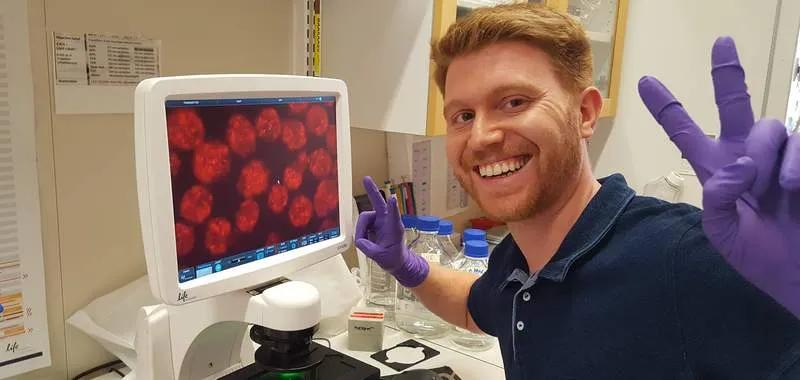«In the future, stem cells can be used in regenerative medicine therapies in which insulin producing cells derived from stem cells will be implanted in diabetic patients to end the disease.
These therapies are still in phase I/II clinical trials in the United States carried out by the company Viacyte Inc in California ».
Thus defends the Leonese Diego Balboa his commitment to develop new genetic techniques to fight the disease.
Works such as Balboa, biotechnologist of the second promotion of this degree at the University of León who has conducted his research at the Biomedical Institute of Helsinki during the last five years, help advance in the treatment of diabetes by demonstrating that it is possibleUse pluripotent cells derived from diabetic patients, together with genome editing tools (CRISPR-CAS9) to generate new models of in vitro diabetes in the laboratory.
"These models have allowed us to investigate in greater detail the molecular causes of some types of diabetes and open the doors to better understand what happens during the development of the disease and design possible pharmacological treatments."
The main cause of diabetes is the alteration in the functioning of insulin -producing pancreatic cells.The research of Diego Balboa, developed in a doctoral thesis, presents a new model to study molecular mechanisms that cause this pancreatic cell dysfunction, with the help of pluripotent stem cells and the edition of CRISPR-CAS9 genes.
The main cause of all diabetes forms is a malfunction in pancreatic beta cells, which are found in pancreatic islets.They have the function of producing and releasing insulin hormone.
Decades of research with animal and cellular models have allowed extensive knowledge about the molecular mechanisms that cause the dysfunction of beta cells.Diego Balboa's doctoral research now offers a more precise model using human pluripotent stem cells."We can obtain beta cells differentiating human pluripotent stem cells and use them as a model to study in vitro pancreatic development and molecular defects that cause a certain types of diabetes," explains the researcher.
Animal and cellular models traditionally have limitations that can significantly affect the way in which new findings can translate into effective treatments to combat diabetes in humans.For example, the development and physiology of rodent pancreatic islets differ from humans, and rodent and human insulin cell lines do not faithfully reproduce the functionality of adult human beta cells.
Until now, the best available model has been the human islets obtained from donor corpse, which are scarce and difficult to manipulate for certain experiments.
Diego Balboa's research has demonstrated the use of human pluripotent stem cells as a tool to investigate diabetes mechanisms caused by alterations in a gene.
These cells can also be transplanted into immunocompromised mice, generating humanized models where the function of beta in vivo cells in a systemic context can be closely evaluated."For this purpose, specific protocols for differentiation of pluripotent stem cells to obtain beta cells using 3D crops in suspension," explains the author of the investigation.
In his work, Diego Balboa also establishes new gene editing techniques based on CRISPR-CAS9 to model cases of monogenic diabetes (those produced by alterations in the single DNA sequencegene).
«When using these approaches, it was discovered that an activating mutation in the STAT3 gene caused neonatal diabetes by prematurely inducing endocrinogenesis of the pancreas.Similarly, the mutations of the INS gene caused a folding of proinsulin deteriorated the proliferation of beta cells due to the increase in the stress of the cellular endoplasmic reticulum ».
Balboa Alonso publicly defended this doctoral work entitled Human Pluripotent stem cells and edition of the CRISPR-CAS9 genome for diabetes modeling at the Faculty of Medicine of the University of Helsinki, on September 21, with his opponent Professor Timothy J. Kieffer of theUniversity of British Columbia in Vancouver, Canada, an expert diabetologist in differentiated stem cell therapy.This defense is published in the series Scholae Doctoralis Ad Sanitatem Investigandam University Helsinkiensis.
In the world there are research groups working with stem cells and edition of the genome for other diseases.


